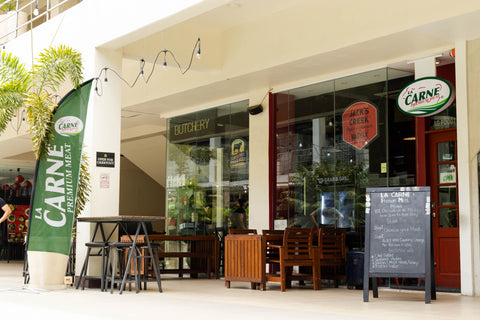When it comes to choosing meat for your family, it’s easy to get confused. There are so many options: grain-fed, grass-fed, organic, pasture-raised and each claims to be the healthiest choice. Many people in the Philippines are now more health-conscious, paying closer attention to what goes on their plates. Yet, one question often comes up: Is pasture-fed lamb really better for you?
If you’ve ever stood in front of the meat section unsure which cut or label to pick, you’re not alone. The truth is, not all meat is created equal. The way animals are raised, what they eat, and how they live can greatly affect the quality, taste, and nutrition of the meat you consume. That’s why understanding pasture-fed lamb and its unique benefits can help you make a more informed and healthier choice for your home-cooked meals.
At La Carne, we take pride in offering the finest quality lambs, raised with care and attention to ensure flavour, tenderness, and nutrition. And for those looking for something truly special, our premium pasture-fed lamb Philippines selection promises a naturally rich and wholesome eating experience that’s a cut above the rest.
What Is Pasture-Fed Lamb?
Pasture-fed lamb comes from sheep that graze freely on open pastures and feed primarily on natural grasses, herbs, and plants. This is different from grain-fed animals, which are typically raised in feedlots and fed a diet of corn, soy, or processed grains to speed up growth.
When lambs graze naturally, they grow more slowly and develop leaner muscle and a richer flavour profile. The lifestyle of these animals for example roaming, foraging, and feeding as they would in nature results in meat that’s not only delicious but also healthier.
In the Philippines, where people are increasingly looking for cleaner and more sustainable food sources, pasture-fed meat has gained attention for its balance between nutrition and taste. Unlike commercial meats that can be high in fat and additives, pasture-fed lamb is as close to nature as it gets, pure, tender, and full of natural goodness.
How Is It Different from Other Meats?
The main difference lies in how the animals are raised and what they eat. Pasture-fed lambs live outdoors, breathing fresh air and feeding on a variety of grasses. This diet gives their meat a unique nutritional profile richer in healthy fats, vitamins, and minerals compared to animals raised in confinement or on grain-heavy diets.
Grain-fed meats, while tender, often contain higher amounts of saturated fat and fewer beneficial nutrients. In contrast, pasture-fed lamb contains higher levels of omega-3 fatty acids, antioxidants, and vitamin E. These differences may sound small, but they make a noticeable impact on both health and taste.
When cooked, pasture-fed lamb offers a more natural, earthy flavour that pairs beautifully with Mediterranean herbs, local Filipino spices, or simple seasonings like salt and garlic. It’s the kind of meat that doesn’t need heavy sauces to shine—it’s naturally rich and flavourful on its own.
Nutritional Benefits of Pasture-Fed Lamb
Choosing pasture-fed lamb isn’t just about taste; it’s also about nutrition. Here are some of the top health benefits that make it a smart choice for families:
1. Rich in Omega-3 Fatty Acids
Pasture-fed lamb contains up to five times more omega-3 fatty acids than grain-fed varieties. These healthy fats support heart health, reduce inflammation, and improve brain function. For people in the Philippines who enjoy lamb dishes like stews or grilled chops, this means every bite offers not just satisfaction but wellness benefits too.
2. High-Quality Protein
Protein is essential for muscle repair, energy, and overall body strength. Lamb is already a good source of protein, but pasture-fed lamb provides it in a more natural and balanced form. It helps support active lifestyles, making it ideal for anyone who loves fitness or simply wants to maintain a healthy diet.
3. Packed with Vitamins and Minerals
Pasture-fed lamb is rich in essential nutrients such as iron, zinc, selenium, and B vitamins. These play a major role in keeping your immune system strong, supporting red blood cell production, and promoting energy metabolism. Iron from lamb is especially beneficial because it’s heme iron, the kind that’s easily absorbed by the body, perfect for individuals who need a natural boost in energy.
4. Lower in Unhealthy Fats
Compared to grain-fed meat, pasture-fed lamb tends to have less total fat and higher levels of healthy unsaturated fats. This means it’s lighter on your heart while still being rich and satisfying in taste. The natural diet of the lamb helps produce lean meat that’s flavourful without being greasy.
5. A Natural Source of Antioxidants
Because pasture-fed lambs consume fresh grass and herbs, their meat contains higher amounts of antioxidants like vitamin E and beta-carotene. These nutrients help protect your body from oxidative stress and support glowing skin, healthy vision, and a stronger immune response.
Why Pasture-Fed Lamb Is Better for You and the Planet
Aside from its health benefits, pasture-fed lamb is also better for the environment and animal welfare. Sheep that graze freely on open land contribute to a more sustainable ecosystem. They help maintain healthy soil and vegetation while living a more natural, stress-free life.
For conscious consumers in the Philippines, this matters. Choosing meat that’s ethically and sustainably raised reflects a growing awareness of where our food comes from. It’s about making choices that are good not only for our bodies but for the planet as well.
How to Cook Pasture-Fed Lamb for the Best Flavour
Because pasture-fed lamb is leaner, it benefits from gentle cooking methods that keep the meat juicy. Here are a few simple tips:
-
Slow Roast for Tenderness: Cook lamb roasts at a lower temperature for longer to help the natural juices stay inside.
-
Use Simple Seasoning: Olive oil, garlic, rosemary, and sea salt are often all you need. Let the natural flavour of the lamb shine through.
-
Avoid Overcooking: Since pasture-fed lamb is leaner, cooking it too long can make it tough. Aim for medium to medium-rare for the perfect texture.
-
Rest Before Slicing: Let the meat sit for about 10 minutes after cooking. This allows the juices to redistribute, keeping each slice moist and flavourful.
Making the Healthier Choice
In today’s fast-paced world, where convenience often takes priority, it’s easy to overlook the quality of what we eat. But taking a step back and choosing pasture-fed lamb means investing in your health and enjoying meat that’s naturally full of flavour, nutrition, and goodness.
From family gatherings to Sunday dinners, pasture-fed lamb brings a special touch to every meal. It’s not just meat—it’s a wholesome choice that supports your wellbeing, your family’s nutrition, and a more sustainable food system.
To Summarise…
Pasture-fed lamb stands out for its superior taste, lean texture, and impressive nutritional value. It’s higher in omega-3s, rich in essential vitamins and minerals, and naturally lower in unhealthy fats. Beyond health, it represents mindful eating—supporting sustainability and animal welfare.
For those who want to experience the true goodness of lamb, choosing the finest quality lambs raised on open pastures makes all the difference. And with La Carne’s premium pasture-fed lamb Philippines, you can enjoy meat that’s pure, tender, and bursting with natural flavour—just the way nature intended.
Love,
Team La Carne




